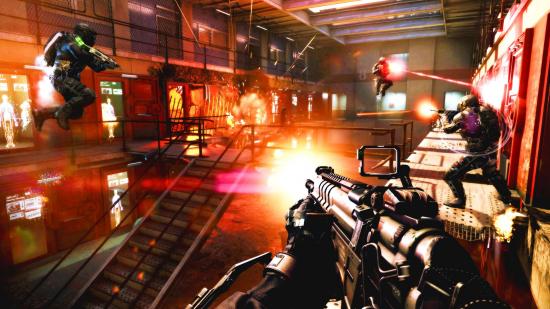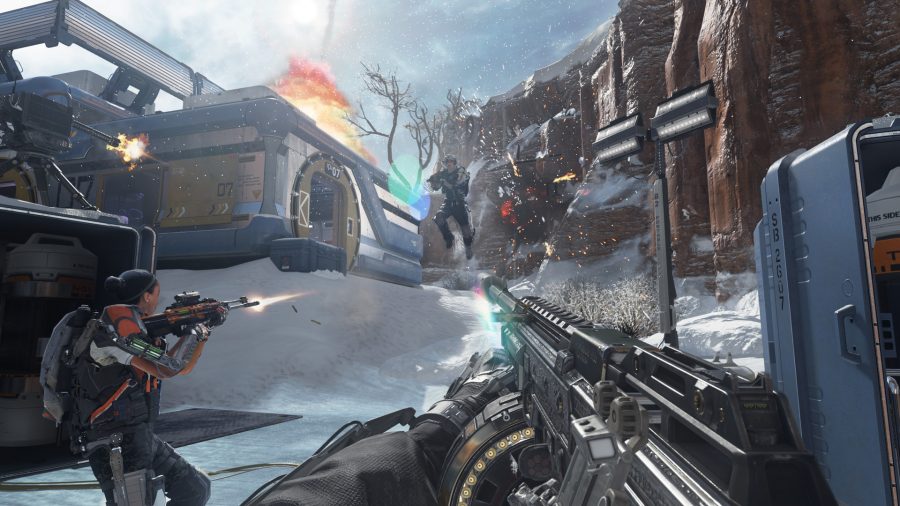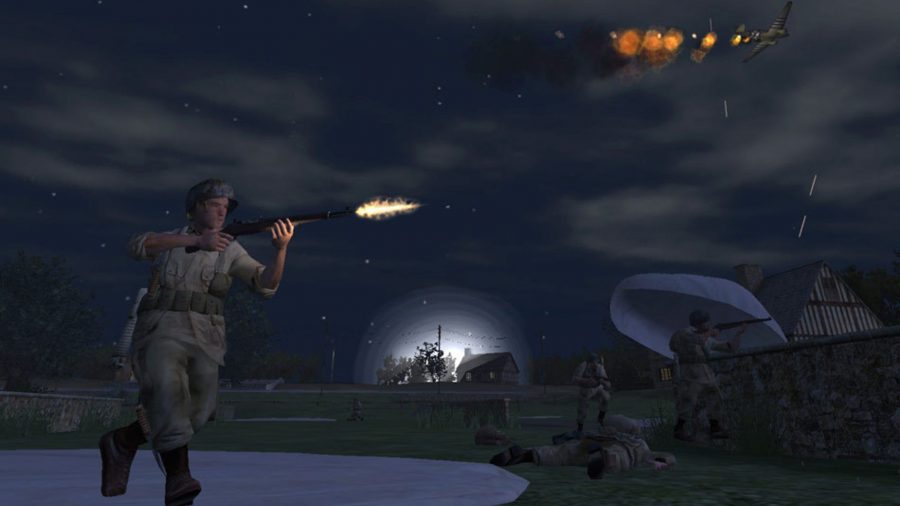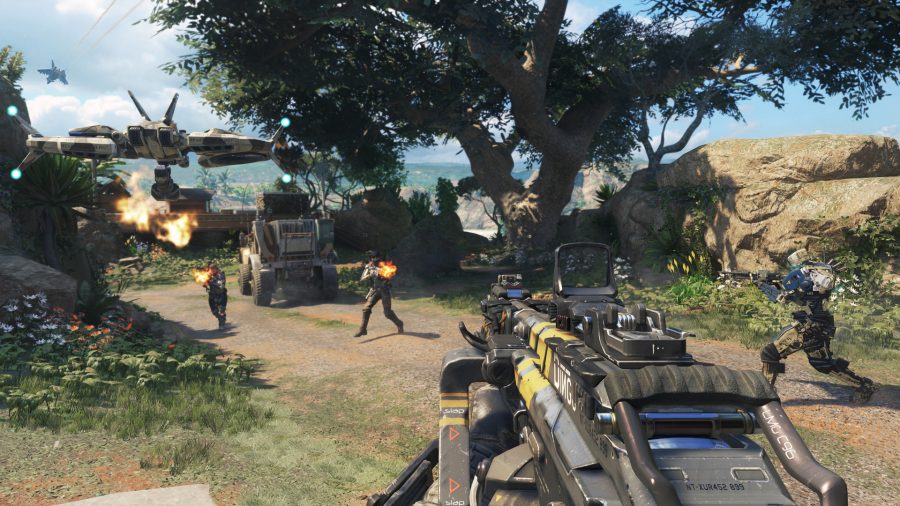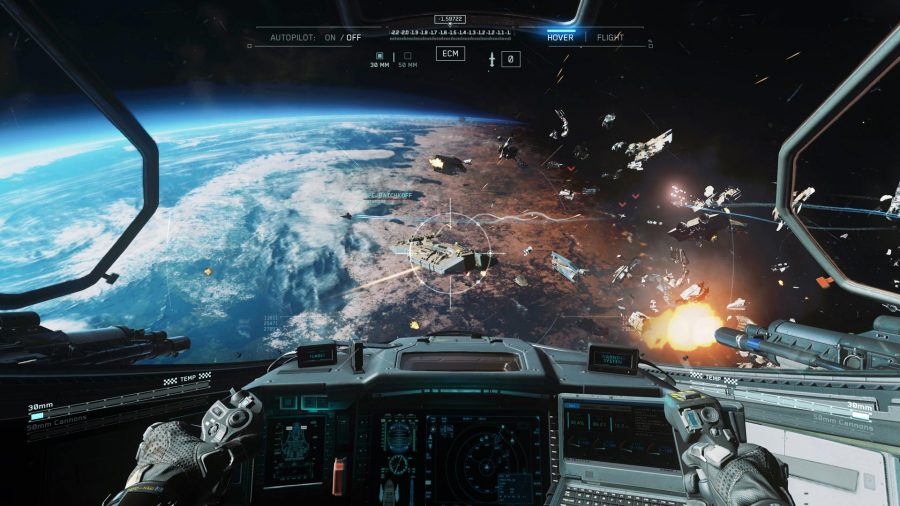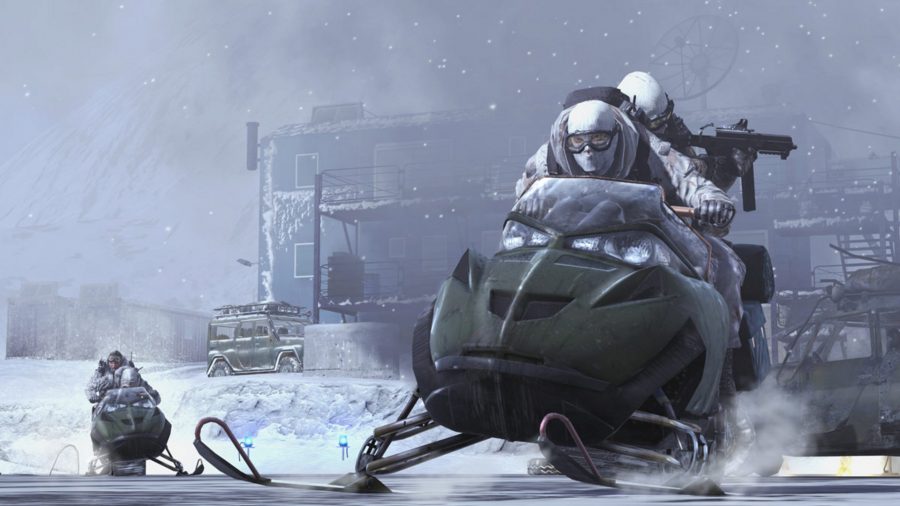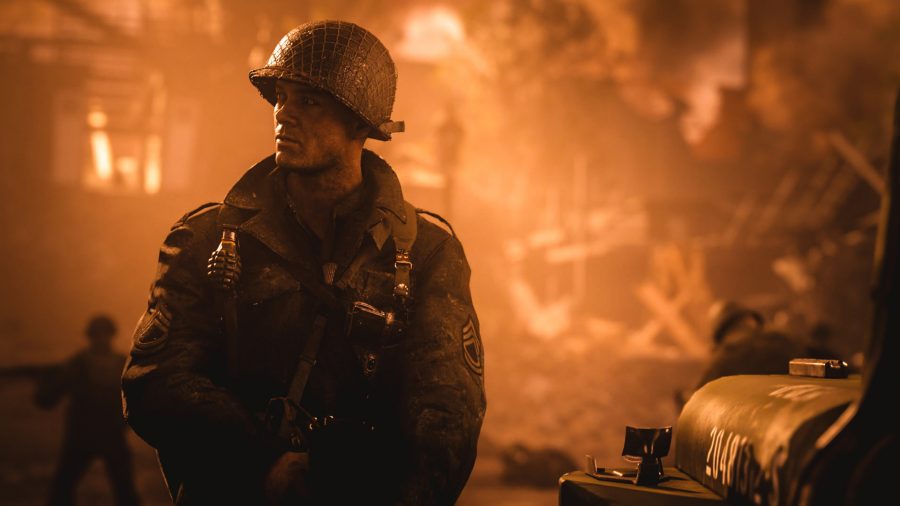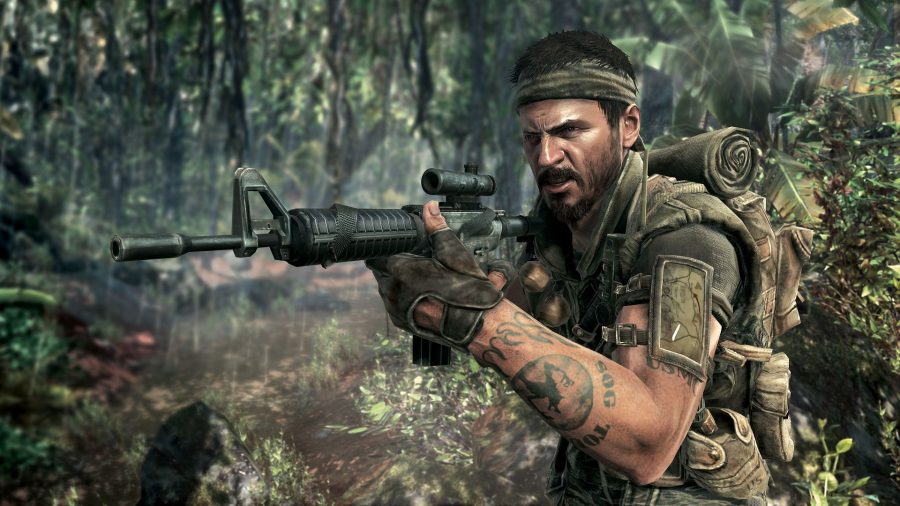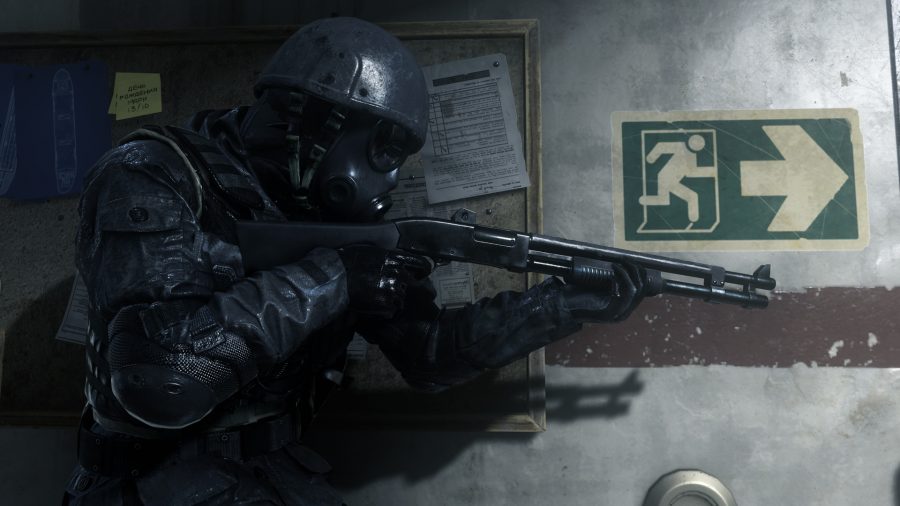January 26, 2021 We originally published this back on 7 December, 2016. In that time, we’ve had three new main Call of Duty campaigns to factor in, so we’ve adjusted the article to reflect those changes.
Did you know that there are 16 Call of Duty campaigns available to play through for PC players? Neither did we, and we’ve played the whole lot of them (even some of the console only ones like Big Red One, but we can’t talk about those here, shhhhh).
While many players have been firmly hooked on the series’ multiplayer modes since 2007, it can be easy to forget that Call of Duty started out as a primarily single player experience. Those experiences were pretty damn good, too, and dragged FPS games into the 21st century with blockbuster set pieces, not to mention relatively new mechanics like regenerating health and aim down sights.
There have definitely been some lulls along the way, not to mention an outright abandonment of single player in the form of Call of Duty: Black Ops IIII, but the latest crop of Call of Duty campaigns show the series is capable of dropping jaws every now and then. Join us as I use science to objectively tell you the definitive ranking of Call of Duty campaigns.
Call of Duty 3
Unfortunately for Treyarch, their first entry in the main series came towards the peak of apathy towards shooters set during either World War. Whilst the campaign is perfectly acceptable and the tank sections in particular are a lot of fun to play, it’s all just a bit forgettable. Only a desperate defence of the town of Chambois that forces you to improvise regularly proves to be a standout moment. It’s worth playing, if only for the sake of completion, but don’t expect to be raving about it afterwards.
Call of Duty: Advanced Warfare
Some big advances in mo-capping and an A-list actor playing the bad guy are not enough to raise this tedious campaign any higher on our list. Traversal is a highlight with the exosuit allowing all kinds of experimentation on the battlefield, and Advanced Warfare not only utilises its near-future setting better than most, but isn’t afraid to subvert it at times, too. The best example of this comes late in the game when, having had access to all manner of abilities throughout, all of them are abruptly removed, forcing you to revert to relying on your own reflexes and instincts. But apart from that we can’t actually remember any standout missions, and that’s kind of what Call of Duty does best.
Call of Duty: Ghosts
Ok, hear us out. Yes, I’m aware that Ghosts might very well be regarded as the worst Call of Duty, certainly in recent years, but that’s primarily down to average multiplayer and a poor man’s Zombies mode in the form of Extinction. In retrospect, the campaign in Ghosts has been unfairly labelled guilty by association.
Set in an alternate reality where a new world order is established after the Middle East has been decimated by nuclear war, Ghosts tells a functional story with some highlights that elevate it, including a mission that serves as a precursor to Infinite Warfare, a couple of surprising twists, a cliffhanger ending that actually deserves a resolution and, most importantly, a mo-capped dog that sits in your tank during one mission. The major let down is a real lack of character development over the course of the campaign.
Call of Duty
The game that started it all, Call of Duty is very much a product of its time, from its lack of exposition (not always a bad thing, to be honest) down to certain game mechanics – for instance, this is the only COD in the main series not to feature regenerating health. However, by being as straight-laced and matter-of-fact as it is, it’s a pure streamlined affair.
In fact, Call of Duty would possibly have been higher on this list, but for the fact that the assault on the Reichstag that represents the game’s climax is actually revisited – for the better, I might add – in 2008’s World at War. It’s a great military FPS for the time, but it’s a far cry from what the Call of Duty series is known for today.
Call of Duty: Modern Warfare 3
Modern Warfare 3 ladles on set piece after set piece in a truly bombastic finale to the Modern Warfare trilogy. There’s a gravity-defying gunfight in a rapidly plummeting jumbo jet. A frantic and explosive escape from a collapsing diamond mine. And, not to forget, the final climactic showdown with series protagonist Vladimir Makarov (finally putting you into the boots of Captain Price after three games of him gruffly shouting in your ear). But that’s pretty much it in terms of spectacle, and much of the rest of the campaign is forgettable.
It pretty much abandons the introspection and restraint of the first game, but doesn’t suffer hugely for doing so. This is helped by having the best voice cast for any game in the series with regulars Billy Murray, Kevin McKidd, and Craig Fairbrass joined by the likes of William Fichtner, Timothy Olyphant, and Idris Elba, who all deliver excellent vocal performances to lend Modern Warfare 3 just a little bit more emotional gravitas.
Call of Duty: Black Ops III
On the surface, the last game in the Black Ops trilogy can initially seem like a disappointment, what with it being the fourth consecutive Call of Duty to have a near-future setting. It’s also surprising that the game has next-to-nothing to link it to the two previous entries in the Black Ops trilogy – no fan service here. However, Black Ops III redeems itself with the introduction of the DNI – Direct Neural Interface – which initially serves as a simple gameplay mechanic, allowing you to hack machinery, download data, and disrupt enemies in combat, but quickly becomes the main focus of the story.
This leads to the Frozen Forest, a visually arresting, nightmarish mission that proves to be the game’s highlight. Black Ops III also benefits from strong vocal performances from the likes of Christopher Meloni and Katie Sackhoff. Lastly, it was the first Call of Duty campaign to offer the choice of a female protagonist – long-overdue, but progress.
Call of Duty: Black Ops II
Marking Call of Duty’s first foray into proper near-future warfare, Black Ops II does a couple of things that elevate it above the games below it on this list. It produces a few lovely moments of fan service that serve as a nice callback to the first Black Ops, and it also introduces a first for the Call of Duty series in the form of a branching story.
At certain key points throughout the campaign, the choices you make as David Mason (son of Alex from the first game) will determine not just those moments directly, but also which of four possible endings you get. It’s a unique selling point for this entry in an otherwise linear series, and it raises another fairly bland campaign to something worth experiencing at least once.
Call of Duty: Infinite Warfare
The game that actually inspired this list because of its ability to divide opinion. The general consensus is that the campaign is actually the strongest part of Infinite Warfare, and it’s not difficult to see why. Eschewing the near-future motif and fully embracing a move into space combat, Infinite Warfare decides to have a little fun with its setting. Zero gravity, grappling hooks, future weapons, spaceship dogfighting, over-the-top villains – it’s all in there, but Infinite Warfare’s real ace in the hole is its characterisation.
Too often in the past, Call of Duty campaigns have framed the deaths of secondary characters as huge emotional events, without ever actually providing the justification for why we should care. No such issue here, as many of your crew are given the kind of character development that means their demise is often affecting in a way you don’t normally associate with a mainstream FPS.
Call of Duty: World at War
The fifth game in the main series features a campaign that is on par with many of the campaigns below it. Nothing more, nothing less, although it did arrive at a time when the series dominated the FPS market. However, World at War gains a couple of extra ranks due to a couple of outstanding set pieces that sit among the best in the series. In one, you’re tasked with launching a raid on Japanese stronghold Makin Island to rescue some American servicemen. Set at night, it seems to be a fairly straightforward stealth mission, but that’s quickly thrown into disarray when the enemy is alerted to your presence and white flares are launched. It’s a lovely looking moment, but you have no time to admire it as things very quickly go sideways.
There’s also the excellent final mission, which sees the assault on the Reichstag from the first Call of Duty revisited with added Gary Oldman as Viktor Reznov. It was great in 2003 and even better in 2008, thanks to Treyarch squeezing a substantial amount of horsepower out of the hardware.
Call of Duty: Modern Warfare 2
As any movie fan can attest to, the second part of a trilogy is often the most difficult to nail. And whereas Black Ops II does little to bridge the games either side of it, 2009’s Modern Warfare 2 does an excellent job of calling back to the first one, while also laying the groundwork for Modern Warfare 3’s closing stanza. It’s best known for No Russian, the mission which set the tone for the series’ controversy-baiting credentials, but the campaign produces several other moments that stick in the memory. The snowmobile section is the right kind of dumb movie-style action, the sieges at Burger Town and Makarov’s safehouse result in testing, tense firefights, and the events that lead to the end-game sequence are among the best plot twists in videogame history.
Call of Duty 2
If Infinite Warfare’s main selling point was its characterisation, then Call of Duty 2’s is all down to its depiction of history. Yes, that sounds ridiculous to say about a game in which you’re tasked with essentially winning huge battles as a one-man killing machine, but it still seeks to tell a story about the Second World War. Nowhere is that tone struck better than in the first mission of the American portion of the campaign – the D-Day assault on Pointe Du Hoc.
Even if you’ve never played the game, you probably know this scene from Saving Private Ryan, and while the PCs of 2005 couldn’t hope to match that level of cinematography, the level of immersion at the time was remarkable. With other standout moments including the Soviet offensive to reclaim Stalingrad and an extended close-quarters firefight in El Alamein, Call of Duty 2 represents one of the best Second World War campaigns of the entire franchise.
Call of Duty: WWII
Edging out Call of Duty 2 as the game with the best Second World War campaign, Sledgehammer Games’ Call of Duty: WWII offers up a genuinely stirring narrative and no shortage of spectacle over the course of its 12 missions. It’s worth noting that it achieved this at a time where the Call of Duty fan base was beyond apathetic towards the series, helping steer the series back on course.
The campaign does an excellent job of taking you on a tour of iconic battles, kicking off with the storming of Normandy Beach and leading all the way to the snowy extremes of the Battle of the Bulge. However, its best feature is how well it develops each and every member of your squad, making you call on them for specific items during battles, and providing plenty of downtime so you can learn what motivates each of them. Even if you don’t like all of your squad mates by the end of the campaign, you’ll care for them all the same.
You can read our Call of Duty: WWII review here, or check out our list of the best WW2 games on PC.
Call of Duty: Black Ops – Cold War
Cold War’s campaign definitely includes a couple of dud missions that you won’t be hurrying to replay, but it more than makes up for it with a couple of the series best missions. Break on Through, for example, is a mind-bending, Stanley Parable-esque hallucination, which tasks with replaying a memory loop, toying with the narrator’s expectations as the world contorts to suit your actions.
The other highlight is Desperate Measures, which expands on the sandbox stealth elements first introduced in WWII’s Liberation mission. You’re free to explore the headquarters of the KGB as an undercover agent, searching for a route to the facility’s underground – there are several ways to complete this, including poisoning a commander, convincing a prisoner to kill the commander in exchange for his family’s safety, and bypassing the commander altogether and cloning his keycard. The rest of the campaign is tight, too, and offers a relatively self-contained experience within the Black Ops storyline.
You can check out our Call of Duty: Black Ops – Cold War review here.
Call of Duty: Black Ops
Treyarch may be responsible for the least memorable campaign on this list, but there’s a reason they’ve got a huge fanbase of their own. Co-written by David S. Goyer, whose writing credits include the Blade and The Dark Knight trilogies, Black Ops tells an intriguing tale of war and espionage that marked a real departure for the series at the time.
Perhaps unsurprisingly for a game co-written by a screenwriter, Black Ops contains a GTA-esque number of movie references – Apocalypse Now and The Deer Hunter being the most obvious – but doesn’t feel cheap as a result. And whilst the late-game twist is probably telegraphed a little more than Treyarch would have hoped, it’s delivered with aplomb and caps off a superb campaign.
Call of Duty: Modern Warfare (2019)
The reboot of Modern Warfare doesn’t quite capture the essence or match the heights of its inspiration. It does come ridiculously close though, and considering the amount of gameplay changes and the graphical update they’re pretty much even. Modern Warfare once again delves into the moral murkiness of modern conflict, foregoing a lot of the jingoism (though not all) the series is known for and supplying the series’ first heroine.
There are plenty of memorable sequences, like the unsettling terrorist attack that opens the campaign. The highlights are undoubtedly the sweep and clear missions, which see you executing thorough, room-by-room raids on buildings. These tense, claustrophobic encounters force you to exercise some serious trigger discipline as you enter each room, unsure if you’ll be faced with an AK47 or a mother protecting her baby.
You can read our Call of Duty: Modern Warfare review here.
Call of Duty 4: Modern Warfare
Representing not only the zenith of the Call of Duty single-player campaign, but possibly the first-person shooter campaign as a whole, Infinity Ward blasted away years of cobwebs accumulated by game after game set during the Second World War to deliver a campaign that felt fresh and, well, modern. Perhaps even more surprisingly, it also delivered several narrative moments that struck an emotional tone not normally associated with a genre normally defined by how many faceless meatbags you can gun down.
Never was that more prevalent than in All Ghillied Up, a beautifully paced masterclass in tension that the series has clearly been seeking to replicate ever since. Add in the moments of introspection and restraint that make you feel less super-soldier and more vulnerable human being, and Modern Warfare remains the best that Call of Duty has ever been. Even now, it’s an essential playthrough.
Original text by Andy Manson. Additional entries and revisions by Jordan Forward.
